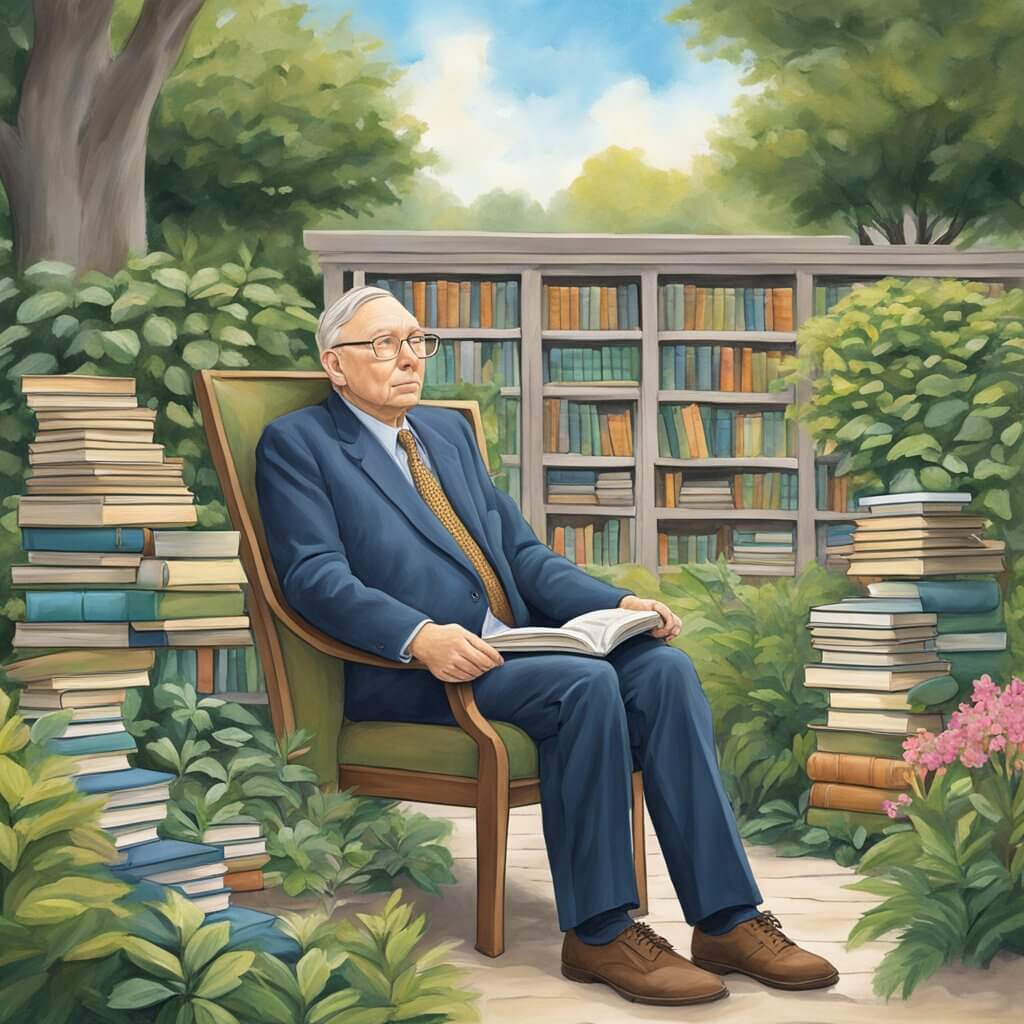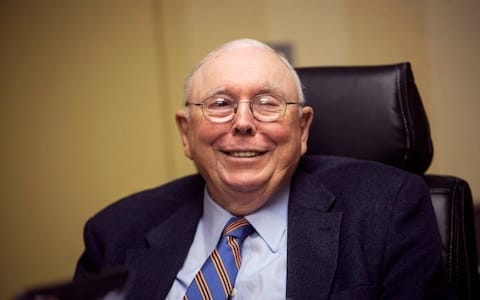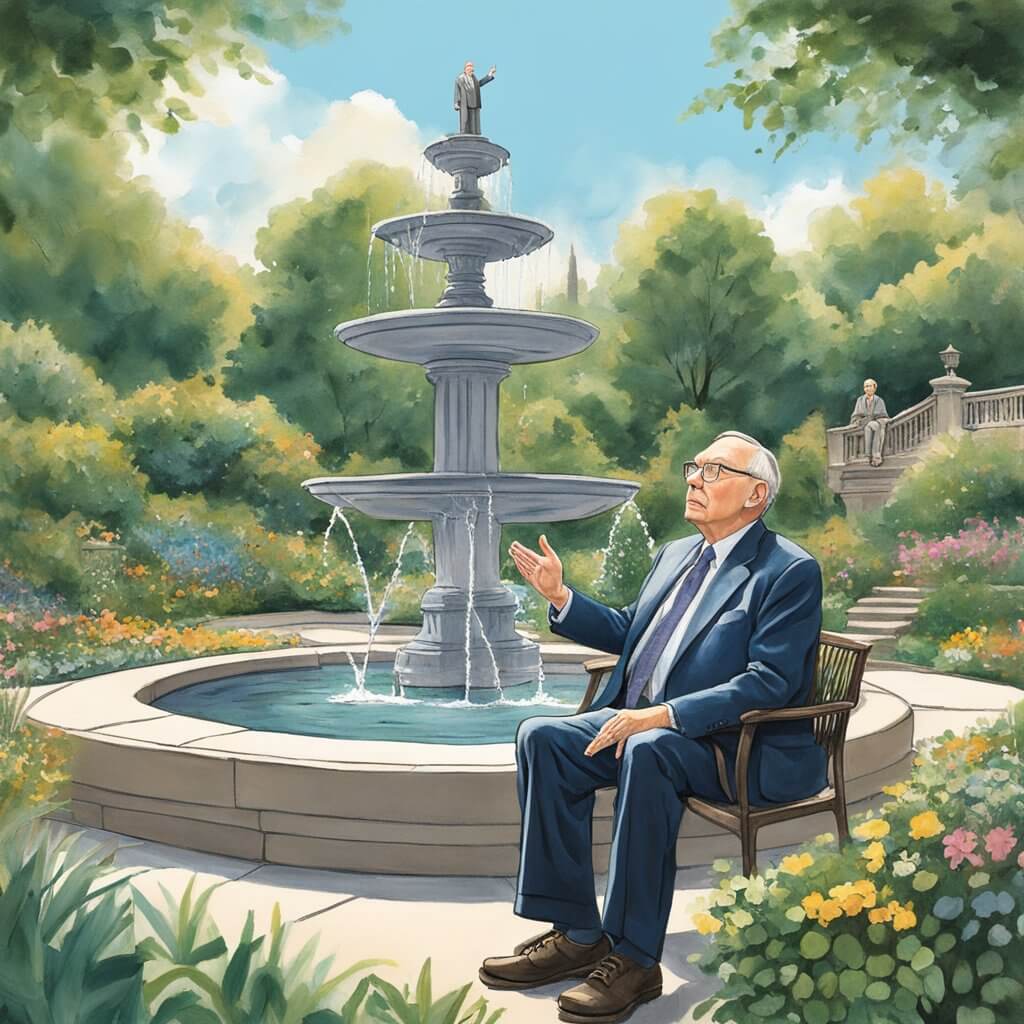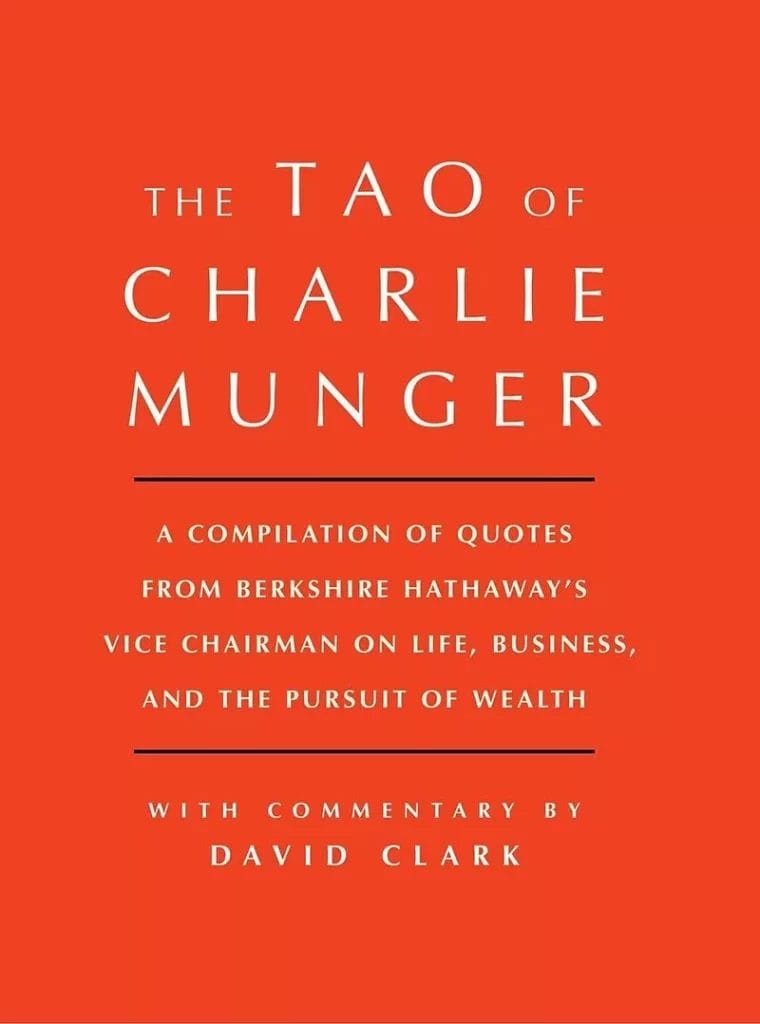Tao of Charlie Munger Book Summary (Investing, Life and Wealth)
The Tao of Charlie Munger is collection of the best blend of wisdom, life philosophy and wealth of the legendary value investor Charlie Munger (1924 – 2023), ex-vice chairman of Berkshire Hathaway and and trusted partner of Warren Buffett.
Accumulated an estimated net worth of $2.6 billion during his 99 years in the world, his wisdom was cataloged in book “The Tao of Charlie Munger“.
Weaves the resilience of the Tao Te Ching with the savvy insights found in “The Tao of Warren Buffett.” Munger’s strategies are rooted in long-term thinking and a deep respect for staying within one’s circle of competence.
Navigating the financial markets with Munger’s guidance means discarding the allure of quick riches for robust, foolproof strategies.
You’ll discover that the profound simplicity of knowing what you don’t know eclipses the fleeting allure of being labeled brilliant.
Cherishing long-term investment in quality businesses over the erratic heartbeat of stock prices, Munger’s sage advice steers clear of the deceptive comfort of diversification, opting instead for concentrated investments.
KEY TAKEAWAYS
- ACATS eliminates the need for manual movement of assets with lower transfer fees and lower chance of error.
- To use ACATS service, your brokerage firm needs to be a member of the National Securities Clearing Corporation (NSCC) and your bank needs to be a part of the Depository Trust Company (DTC).
- ACATS is accommodating Stocks, Mutual Fund, IRAs, trusts, and brokerage 401(k)s transfer but not annuities, held with insurance companies.
Part 1: Charlie’s Thoughts on Successful Investing

In exploring Charlie Munger’s approach to investing, you’ll find that he emphasizes a blend of patience, recognizing the limits of your knowledge, and the significance of rare opportunities.
His investment wisdom, gathered through years of experience, sheds light on the path to success in the financial markets.
#2 Circle of Competence: Knowing what you don’t know is more useful than being brilliant
Identifying the boundaries of your expertise is crucial. This self-awareness helps you avoid ventures that are beyond your understanding and stick to those within your circle of competence. Munger argues that recognizing what you don’t know can be more valuable than your intelligence.
#3 Avoid being an idiot: People are trying to be smart – all I am trying to do is not to be idiotic, but it’s harder than most people think
Wisdom often lies in steering clear of foolishness rather than striving to appear smart. Munger suggests that avoiding idiotic decisions requires effort and is central to successful investing.
#8 Sitting on your a*s: Buy one or two great businesses, not many
Simplicity is key, according to Munger. Rather than spreading your investments thinly, it’s better to invest in one or two companies with solid potential. Attaining wealth might just require a few smart choices.
#9 The dawning of wisdom: Acknowledging what you don’t know is the dawning of wisdom
Admitting ignorance can be a profound step towards gaining wisdom. This approach helps you recognize when you’re outside your circle of competence, guiding you towards smarter investment decisions.
#11 A mispriced gamble: You’re looking for a mispriced gamble. And you have to know enough to know whether it is mispriced
Investing often comes down to identifying a mispriced gamble. Discerning whether an asset is undervalued is at the heart of value investing.
#13 When to Bet Heavily: You should remember that good ideas are rare – when the odds are greatly in your favor, bet heavily
Exceptional ideas don’t come by often. When you encounter one where the odds are stacked in your favor, Munger advises to capitalize on the opportunity and invest substantially.
#15 Foresight: I’ve never been able to predict accurately. I don’t make money predicting accurately. We just tend to get into good businesses and stay there
Predicting market movements isn’t Munger’s strategy. He reveals that insightful long-term investments have contributed more to his wealth than trying to forecast the unpredictable.

#19 Patience: I succeeded because I have a long attention span
Patience is often the companion of success in investing. Munger attributes his accomplishments to the ability to maintain a long attention span, which permits him to wait for the right moment.
#25 Waiting: It’s waiting that helps you as an investor, and a lot of people just can’t stand to wait
Many investors struggle with inactivity. However, waiting for the perfect moment, according to Munger, is a key strategy in making the most of investment opportunities.
#29 Understanding the odds: Move only when you have the advantage—you have to understand the odds and have the discipline to bet only when the odds are in your favor
Knowing when to act is pivotal. Recognize the advantage you hold and proceed only when you’re confident that the odds support your decision.
#34 Opportunity: You do get an occasional opportunity to get into a wonderful business that’s being run by a wonderful manager. And, of course, that’s hog heaven day
Such golden chances are what investors dream about. When you come across a stellar business with excellent leadership, seizing that chance can lead to significant gains.
#43 No Single Formula: There isn’t a single formula. You need to know a lot about business and human nature and the numbers… It is unreasonable to expect that there is a magic system that will do it for you
Munger stresses that no single formula exists for investing success. Instead, thorough knowledge across various domains is requisite for making informed decisions.
#44 On technology: The great lesson in microeconomics is to discriminate between when technology is going to help you and when it’s going to kill you
Technology can be a double-edged sword in the investing world. It’s vital to ascertain when it will be a boon to your investments and when it could lead to their downfall. Understanding this can significantly influence your success.
Lessons Learnt From Part 1 of the Book
Lesson 1: Keep it Simple
Within The Tao of Charlie Munger, one uncovers a wealth of investing wisdom. You’ll find that Munger emphasizes a few key principles that can guide your investing journey.
First and foremost, recognize the power of simplicity in your investment portfolio. Munger suggests that hitting a few select, high-potential investments can lead to significant wealth over time, rather than spreading your funds thin across multiple average opportunities.
Lesson 2: Be Prepared
Intrinsic to his philosophy, displayed in many of his quotes, is the concept of the mispriced gamble.
Munger advises that investing is essentially searching for opportunities where the public perception of value diverges from reality. It’s in these gaps where you, the investor, can seize advantage.
To do this effectively, you need to be well-informed and discerning—acting where others hesitate.
Lesson 3: Stay Focus
Moreover, Munger, aligned with The Tao of Warren Buffett, is famously against the widespread notion of diversification.
The acumen here isn’t to collect a wide array of stocks but to focus on those you understand deeply and trust unwaveringly.
His maxims frequently echo the sentiment that it doesn’t take a portfolio filled with winners to succeed, just a precious few—chosen wisely with a blend of patience and insight.
Part II: Charlie on Business, Banking, and the Economy

Charlie Munger’s insights offer you a unique perspective on economics and the influence of human behavior in financial markets.
His principles, drawn from a variety of sources including The Tao of Te Ching and articulated by David Clark in The Tao of Charlie Munger, reveal the underlying logic of business and economy that can guide your investment decisions.
#56 Printing money: You might consider that democracies are vulnerable to inflation for simple reasons; politicians inherently have spending power. With the power to print money at their disposal, they often use funds to secure votes, leading to an inflationary economic environment.
There is a delicate balance between political decisions and economic stability.
#60 Carrots and sticks: Your progress in the economic world hinges on incentives and deterrents. You have to work, and a system of carrots and sticks is vital. This setup ensures motivation and deterrents are in balance, as the belief that wealth can be achieved through voting is a misconception that doesn’t hold up to scrutiny.
A well-designed system of carrots and sticks ensures motivation and deterrence are finely balanced for sustained progress.
The Wealth Effect: When stock prices climb, your spending might increase; this is the wealth effect at work.
Charlie noted this impact often gets underestimated by economists; yet, he maintains his stance that its influence is significant in stimulating consumer spending.
Understanding the dynamics of the Wealth Effect is crucial for comprehending patterns in consumer behavior and economic stimulation.
Asset Inflation: Witnessing a lifetime of inflation, from nickel hamburgers to current prices, helps you grasp the nature of asset inflation without succumbing to doom and gloom.
Munger’s experience indicates that, although inflation is evident, it doesn’t necessarily spell disaster for the investment climate.
Lessons Learn From Part 2 of the Book
Lesson 1: Look Long-Term
In the spirit of Charlie Munger’s insights, you’ll find that his approach to business is deeply rooted in long-term thinking.
He emphasizes the importance of recognizing the intrinsic value of a company, a concept that might appear overshadowed by short-term market fluctuations.
In understanding a business, he advises you to consider the economic moats that protect it from the competition, just as fortifications would shelter a medieval castle.
Lesson 2: Avoid Leverage
Turning to banking and the economy, Munger’s philosophy echoes elements found in The Tao of Te Ching, advocating for a method that is patient and wise.
He implores you to be wary of excessive optimism in banking—a sector particularly susceptible to the pitfalls of over-leverage.
By taking prudent risks and avoiding the herd mentality often present in financial markets, you too can navigate the complex world of economics with a steady hand.
Lesson 3: Borden Your Knowledge
Lastly, Munger’s advice, as presented by David Clark, encourages you to broaden your knowledge across various disciplines.
He understands the economy is an entangled web, influenced by a multitude of factors.
By adopting a multidisciplinary approach, you will be better equipped to appreciate the subtle nuances of business cycles, thereby forging a robust and versatile financial acumen.
Part III: Charlie’s Philosophy Applied to Business and Investing

You’ll see how Charlie Munger’s wisdom pivots companies towards long-term success and prudent investment.
Through the lens of his philosophy, we glance at business models, the power of incentives, and strategic governance using specific examples.
#74 Two kinds of businesses: There are two kinds of businesses: the first allows you to earn a 12% return and pocket it yearly, while the second also earns 12% but requires you to reinvest all surplus cash.
According to Charlie Munger’s philosophy, the latter can be frustrating, as it never frees up cash for you to use.
#80 Incentives: Imagine a company that changed overnight. This was the case with Federal Express, which struggled with on-time package sorting. Switching pay to per-shift rather than per-hour allowed workers to leave upon completing their work, instantly solving their efficiency problems.
Changing the pay structure to per-shift instantly resolved efficiency problems, showcasing how a strategic shift in incentives can revolutionize business operations.
#91 Singapore: Think of a place that became a symbol of progress. Singapore’s impressive development is attributed to Lee Kuan Yew, often compared to the “Warren Buffett of Singapore.”
The concentrated decision-making in Singapore stands in contrast to a democratic approach, highlighting the impact of decisive leadership on remarkable development.
See’s Candies: Look at a sweet success story. Upon acquiring See’s Candies, Munger realized the strength of a strong brand.
Strong brands could steadily increase prices without affecting customer loyalty.
The ability to increase prices steadily without affecting customer loyalty becomes a cornerstone of Berkshire Hathaway’s investment strategy.
Lessons Learn From Part 3 of the Book
Lesson 1: Resist Temptation
In the realm of business and investing, Charlie Munger’s approach is both unique and pragmatic.
You’ll find that his strategies are grounded on the idea that markets often misprice stocks, leading to opportunities for the astute investor.
This philosophy hinges on recognizing the long-term value of a company and resisting the temptation of short-sighted market trends.
Lesson 2: Be Cost Conscious
For Munger, costs are pivotal; as observed at companies like Costco, whose relentless focus on minimizing operating costs underpins their success.
They eliminate unnecessary expenses, such as avoiding the provision of shopping bags, passing these savings to their customers and shareholders alike.
Lesson 3: Have Courage
Investing, according to Munger’s principles, isn’t about following the crowd. It’s about having the courage to hold firm and let the underlying economics dictate your actions.
This part of the Tao of Charlie Munger is a reminder that patience, coupled with a deep understanding of a business’s value, is central to this approach.
It’s an invitation to think long-term and avoid the pitfalls of short-term gain in favor of enduring success.
Part IV: Charlie’s Advice on Life, Education, and the Pursuit of Happiness

Charlie Munger, a legendary figure in the world of investing, generously shared wisdom not just on finance but also on living a fulfilling life.
From the importance of continual learning to embracing simplicity, his advice extends beyond the bounds of business.
#92 One step at a time: Spend each day trying to be a little wiser than you were when you woke up.
The compounding effect of incremental improvements over time leads to significant advancements and, ultimately, deserving the fruits of life.
#95 Career advice: Charlie’s three rules for a career start with integrity: don’t sell anything you wouldn’t buy yourself. He also emphasizes the value of respect and admiration in professional hierarchies and the joy that comes from working with people you enjoy.
Munger’s three rules for a successful career begin with integrity. Respect, admiration, and the joy of working with like-minded individuals are highlighted. These principles provide a compass for navigating the professional landscape.
Know-it-all’s: Beware of those who have answers for everything, especially when their knowledge on the subject is lacking.
Munger appreciates humility and the willingness to recognize the limits of one’s understanding.
He warns against individuals who claim to have answers for everything without deep knowledge. Embracing humility and recognizing the limits of one’s understanding are essential traits he values.
#98 Admitting Stupidity: Admitting when we’re wrong, according to Munger, is a powerful way to improve.
Munger advocates for the power of admitting when one is wrong as a potent way to improve. Recognizing and learning from mistakes is not a sign of weakness but a demonstration of intellectual honesty and a commitment to continuous growth.
#100 Specialization: According to Munger, success often comes from extreme specialization. By focusing deeply on a particular niche, you may have a better chance at becoming truly distinguished in your field.
Success, according to Munger, often stems from extreme specialization. By delving deeply into a specific niche, individuals increase their chances of becoming truly distinguished in their field. This insight challenges the notion of spreading oneself too thin and highlights the value of focused expertise.
#101 Not Working: Munger’s experience speaks to the value of lifelong learning over constant labor.
By simply thinking and reading, one can gain profound insights and knowledge without the grind of what’s typically considered ‘work’.
#103 Out with the Old: Every year, Munger challenges himself to reassess his deeply held beliefs, recognizing that progress often requires shedding outdated ideas in favor of new, more accurate understandings.
This commitment to intellectual flexibility is a hallmark of Munger’s approach to growth.
A Moral Imperative: For Munger, rationality isn’t just a practical tool, it’s a moral obligation. Being less than as smart as you can be equates to a failure in your duty to yourself and others.
This perspective emphasizes the ethical dimension of intellectual development and self-improvement.
#105 Secret of success: Passion, according to Munger, is a critical driver of success; without genuine interest, even the most intelligent are unlikely to achieve significant successes.
Genuine interest is a prerequisite for significant achievements. Without passion, even the most intelligent individuals are unlikely to reach their full potential.
Being Frugal: Being frugal is a defense against inflation, proposes Munger.
If you keep your material needs simple, economic fluctuations will have less impact on your life.
Ideology: Charlie warns against intense ideology, suggesting it can imprison the mind, preventing clear thinking and sound decision-making.
A cautionary advice encourages individuals to approach challenges with an open mind rather than rigid preconceptions.
#112 Secret to Wisdom: You won’t find wisdom amidst distraction and multitasking.
Munger advocates for focused, deep reading as a pathway to knowledge and wisdom, much like his business partner, Warren Buffett.
#135 Perspective: Understanding opposing viewpoints better than your opponents is a testament to intellectual honesty and a disciplined mind, something Munger highly values.
Always encourages a holistic approach to problem-solving and decision-making.
#119 Marriage advice: When it comes to marriage, Munger’s advice is to look for a partner with reasonable expectations rather than superficial attributes.
Compatibility and shared values are key in long-term relationships.
#131 A seamless web: Trust is the cornerstone of not just personal relationships but also successful professional bonds.
Munger advises creating a life of deserved trust and cautions against overly complex prenuptial agreements.
#134 Truth: Simplicity in honesty is key.
By always telling the truth, you save yourself the complexity of maintaining falsehoods, an approach highly recommended by Munger.
Lessons Learn From Part 4 of the Book
Charlie Munger’s legacy lives on through his timeless advice on success, life, and the pursuit of happiness.
Each maxim underscores the importance of integrity, learning, and the simplicity at the heart of a well-lived life.
Lesson 1: Continuous Education
Charlie Munger, renowned for his wisdom, emphasizes the significance of lifelong learning.
He believes education should not cease at formal schooling but continue through an unending pursuit of knowledge.
His philosophy aligns with the maxim, “to the curious, life can be thrilling as discoveries never end.”
Lesson 2: Know One’s Limitation
Drawing on life experiences, Munger shares a rich collection of principles that guide daily living.
He underscores the importance of understanding one’s limitations, a principle that reverberates in his notable quote, “knowing what you don’t know is more useful than being brilliant.”
Lesson 3: Find Job Though Helping Others
Moreover, his maxims on happiness converge on finding satisfaction in work and relationships, rather than material gains alone.
Munger encourages seeking joy in the accomplishments of others, a divergence from a solely self-centered approach to life.
Your own pursuit of happiness, according to Munger, is significantly enhanced when you appreciate and contribute to the collective happiness of those around you.
Reading The Book
“Tao of Charlie Munger” is a way of life of joy, success and attainment.
It’s not everyday, you get to learn from a widely successful billionaire with 99 years of experience.
Charlie Munger’s legacy will go on for decades, and I thank him from the bottom of my heart for all the wisdom that he shares.
Munger’s advice reflects the quintessence of a philosophy rooted in clear-sighted realism and unassuming wisdom, and his quotes on success often distill complex ideas into succinct, practical guidance that you can apply in various aspects of your life.
Adopting his pragmatic approach could potentially steer you toward a more fulfilled, knowledgeable, and contented existence.
Frequently Asked Questions

In this section, you’ll find answers to common queries about ‘The Tao of Charlie Munger,’ which distills the wisdom of investor Charlie Munger.
What are the key takeaways from ‘The Tao of Charlie Munger’?
The key takeaways include the importance of patience, knowing the edge of your competence, and the significance of rational decision-making. Understanding these principles can profoundly affect your investment approach.
How does ‘The Tao of Charlie Munger’ encapsulate his investment philosophy?
The book distills his philosophy into accessible knowledge, emphasizing the value of a disciplined and patient approach. It encourages broadening your mental models and focusing on long-term success rather than short-term gains.
Can you describe some of Charlie Munger’s principles presented in ‘The Tao of Charlie Munger’?
Munger’s principles are grounded in understanding your own limitations, the concept of ‘Latticework of Mental Models’, and the wisdom of inverting problems to find solutions. These guide you towards smarter, more thoughtful investments.
What insights does ‘The Tao of Charlie Munger’ provide on decision making?
It provides insights on approaching decision making with a multifaceted perspective and emphasizes the importance of acknowledging what you don’t know. This can lead to better choices both in investing and in life.
How does ‘The Tao of Charlie Munger’ reflect on his partnership with Warren Buffett?
‘The Tao of Charlie Munger’ illuminates how Munger’s wisdom has greatly influenced his business partner, Warren Buffett. Their partnership reflects a profound synergy where Munger’s philosophies on investing have been integral to their combined success.
What are some notable quotes from ‘The Tao of Charlie Munger’?
Notable quotes from the book highlight the essence of wisdom and experience, such as “Knowing what you don’t know is more useful than being brilliant.” These quotes serve as mantras for the thoughtful investor.
In my opinion, Charlie Munger is one of the greatest mentor in the modern human history.
And if you are a fan of Charlie like me, you may want to watch this last interview with Charlie and learn from this amazing mentor and philanthropist that have helped millions of aspiring investors.
If you are interested in quotes like these, check out these other quotes:
- Tao of Charlie Munger Book Summary (Investing, Life and Wealth)
- 10 Best Charlie Munger Quotes for Investors on Success, Life and Investing (Timeless Wisdom of an 99 Year Old)
- 19 Best Peter Lynch Quotes on Stock Market Investing (One Up on Wall Street)
- 28 Best Ray Dalio Quotes on Life, Investing and Success
- 53 Powerful Entrepreneurs’ Quotes For Aspiring Startups
Read Also:
- How to Use Webull Singapore to Trade, Buy and Sell Stocks? (Beginner’s Guide)
- How to Use Moomoo to Trade, Buy and Sell Stocks? (Beginner’s Guide)
- Best Trading Platform For Beginners in Singapore (Students, NSF, Fresh Graduates)
- Day Trading For Beginners: Guide On How To Become a Day Trader
- Average Brokerage Fee in Singapore: 20+ Broker Fees Compared
Join 900+ BUDDIES who are growing their wealth with our weekly Income Newsletter
Antony C. is a dividend investor with over 15+ years of investing experience. He’s also the book author of “Start Small, Dream Big“, certified PMP® holder and founder of IncomeBuddies.com (IB). At IB, he share his personal journey and expertise on growing passive income through dividend investing and building online business. Antony has been featured in global news outlet including Yahoo Finance, Nasdaq and Non Fiction Author Association (NFAA).


